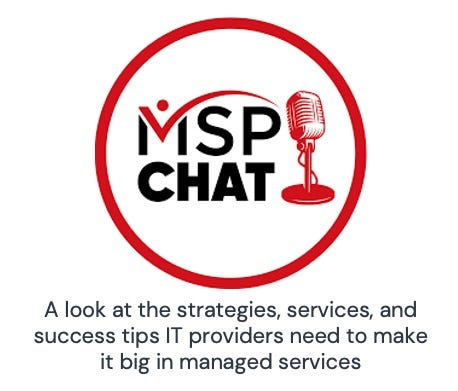Why Distributors Are Steering MSPs Toward Microsoft Copilot
Top distis say there’s money to be made—now—on Microsoft and AI. Plus: how ePlus is monetizing AI services and why Storage Guardian wants MSPs thinking Dropbox.
It’s a measure of how young generative AI is, though well into its second year of celebrity status, that people still can’t decide whether to love it or fear it.
And I’m talking about the same people in a lot of cases. Latest example, from JumpCloud: 79% of IT professionals believe AI will be a net positive for their organization, and 62% agree it’s outpacing their ability to keep that organization secure.
So clearly a lot about AI is still TBD, including a contentious topic I’ve been writing about some lately: whether or not MSPs who are saving money with the technology by boosting technician productivity can make money with it as well, and today versus a few years from now. John Dusett, vice president of technology solutions at Ingram Micro, has a pretty clear take on that question.
“The short answer is yes,” he says. “We are hearing from our partners and we’re hearing from our technology manufacturers that they all see near-term and long-term opportunities in AI, no question.”
In fact, all of the major distributors not only say the same thing but are backing that conviction with meaningful investments in new partner resources. At TD SYNNEX, for example, it’s the Destination AI program launched last summer. At D&H, it’s the more recently introduced Go Big AI program. And in both cases, Copilot for Microsoft 365 (a service some don’t see as a serious immediate money-maker) is absolutely part of the AI revenue equation, especially now that everyone in the Microsoft Cloud Solution Provider program can sell it.
“So many of our MSPs and VARs are already partners with us for Microsoft through their CSP program,” says Jason Bystrak (pictured), senior vice president of modern solutions at D&H. “Copilot is an add-on to that, so it’s a great reason to say, ‘you already have your cloud subscription for Office 365. Let’s talk about layering Copilot on top of that.’”
Every time a client agrees to do so, their IT provider collects a little licensing revenue, but that’s not what distis say is exciting about Copilot. It’s everything that happens before and after that license gets provisioned, like helping customers understand why Copilot’s worth deploying in the first place by hosting envisioning workshops. Done right, those produce consulting fees while cementing your position as an indispensable tech thought leader.
“It’s an opportunity for a partner to talk to their end user about a business outcome that they probably couldn’t have seen before,” Dusett says. It also leads directly to follow-on assessment, deployment, and training engagements aimed at delivering that outcome.
Ingram’s professional services team, Dusett adds, can help partners who have never delivered such services provide them anyway. “We know that these services have to be done, so we’re building the capability to do them on behalf of a partner if they’re not ready to do it,” he says.
Meanwhile, there’s a reason Intel, Dell, and HP are among D&H’s launch partners for its Go Big AI initiative: AI projects often drive infrastructure upgrades. “It’s going to take more compute power,” Bystrak notes. “That’s going to be PCs that are AI capable and enabled.”
Even better, from an MSP’s standpoint, there’s recurring revenue to be made after all that prep work. AI governance and security are never-ending concerns, Dusett observes. Companies using Copilot are going to produce more tickets too, adds Bystrak, who encourages partners to bump up their monthly management fees accordingly.
“It’s another application that you’re going to be supporting, and frankly, it’s a complex one,” he says.
It’s also likely to be your customer’s first but far from last step on the road to embracing AI. “Similar to cloud, it’s a journey,” Bystrak says.
How ePlus is igniting AI services income
Let’s just stipulate upfront that unless you’re publicly traded and recorded over half a billion dollars of net sales in your most recent fiscal quarter, some of what you’re about to read might not apply to you. Most of it will, though, and it’s a great example of how a real-world MSP has brought many of the concepts Dusett and Bystrak describe to life.
The MSP in question is ePlus, which recently launched its biggest foray yet into artificial intelligence. I say “biggest foray yet” because the company isn’t entirely new to AI services, according to VP of Cloud Solutions Justin Mescher (pictured).
“We’ve been doing this for a couple of years, responding to ad hoc requests,” he says. Most of those projects involved Fortune 100 companies, Mescher adds, until the launch of ChatGPT late in 2022 turned AI from a niche offering for big businesses with deep pockets into a mainstream priority all the way down to SMBs.
“People are taking it seriously now and realizing that if they aren’t doing it, their competitors are doing it,” he says.
In response to that surging interest, ePlus introduced a service called AI Ignite a month ago. Think of it as a series of services, actually, for companies at every level of maturity. Many of those offerings will sound familiar to readers of this week’s post, including the workshops and assessments ePlus does for “AI Curious” newcomers to the technology.
“They know they want to do something with AI. They know they need to do something with AI. They’re probably being told to do something with AI. But they might not know what that thing is yet,” Mescher says. ePlus helps them arrive at a practical, specific use case. That might be a self-serve chatbot that helps a government agency steer people to relevant programs and resources, for example, or an application that helps a hospital predict and lower readmission rates.
“Then we help them unpack that completely,” Mescher says. “That’s going to be everything from the legal and contractual implications, HR implications, operational implications, security, data governance, all those pieces.”
Now, having guided the customer from “AI Curious” to “AI Ready” status, ePlus builds them a solution, which it then secures and supports in exchange for monthly fees.
“That’s the ongoing care and feeding and maintenance of those solutions, of the data, of everything,” Mescher says. “It takes skill sets that most people haven’t employed for, so there’s significant services upside.” The smaller the business, moreover, the greater the upside.
“An SMB is more likely to be short-staffed,” Mescher observes.
If Ignite doesn’t sound like something your company can replicate yet, he continues, ePlus sees as much promise in Microsoft Copilot as Ingram and D&H do.
“It’s so accessible to everybody,” Mescher says. “We definitely see it as an area where organizations need help and they’re looking to rapidly lean in, so there’s definitely opportunity there.”
And far beyond there too. “It’s a very messy space right now. It’s very noisy,” Mescher says of AI. “Everybody needs help.”
Hungry for even more about AI as a money maker?
Listen to this week’s episode of the MSP Chat podcast, which features an interview with Jimmy Hatzell of Hatz AI, a company you’ve read about here.
There’s more to the cloud than Microsoft
It’s not all about AI, of course. As Nerdio would be quick to tell you, and Storage Guardian would be quick to agree, there’s still a ton of life left in the cloud.
Where Nerdio and Storage Guardian might disagree, however, is on how wedded MSPs should be to Microsoft’s cloud alone. Storage Guardian sees supporting Dropbox too as a way to add businesses either leery of or bruised by consumption-based storage to your clientele.
The addressable market is certainly big enough. According to TD SYNNEX, over three-fourths of workloads are still running on-premises. “There’s still literally hundreds of thousands of on-prem servers that have not gone to the public cloud,” says Omry Farajun, Storage Guardian’s president and CEO (pictured).
There are a lot of reasons why, but Farajun suspects that the size and unpredictability of consumption-based billing for public cloud storage services is among the biggest.
“There’s runaway costs once you go to the public cloud,” he says. Or at least there can be. Dropbox, according to Farajun, is an exception to the rule.
“They have one fixed monthly cost per user,” he says. “You’ll never run into this, ‘Oh my God, it’s $10,000 a month. I didn’t know it was going to be this expensive.’”
Moving on-prem data into Dropbox can be complex and time-consuming however. So last year, acting on a direct request from Dropbox, Storage Guardian introduced a solution that automates the process (much as tools from SkyKick and BitTitan, among others, automate migration to Microsoft 365 and Google Workspace).
Unlike existing Dropbox migration products, Farajun says, Storage Guardian’s is a multi-tenant system designed specifically for MSPs and backed by deep technical support. An optional “white glove” outsourcing service can perform migrations on behalf of MSPs who would rather not handle the task themselves.
After the move is complete, Farajun observes, partners can charge monthly management, backup, and security fees. More importantly, he adds, they can also use the efficiencies they helped customers realize by switching to Dropbox as an opening for additional sticky, strategic cloud cost optimization discussions.
“That’s part of your technology business review that you can do for them to save them some money,” Farajun says.
Storage Guardian’s migration tool is available on the company’s website, in Ingram Micro’s cloud marketplace, and in Dropbox’s own app marketplace.
Also worth noting
Syncro has a new CEO, who will be no stranger to one-time Continuum partners.
Hyperautomation vendor Pia has a new CEO too, who plans to juggle that gig with his previous one as CEO of TimeZest.
Google partners interested in hyperautomation will now find UiPath software on the Google Cloud Marketplace.
The new Veeam Data Cloud combines cloud storage, backup, and ransomware recovery for Microsoft Azure and Microsoft 365 in a single subscription.
N-able has enrolled SaaS Alerts, Auvik, Actifile, and Enclave in its Technology Alliance Program.
Keeping up with the times as it has for 40 years, The ASCII Group has introduced an “AI Pit Crew” to help member MSPs embrace artificial intelligence.
Reinvent Telecom used ASCII’s first conference of the year to unveil a major wholesale cloud communications initiative and four new leaders.
TD SYNNEX now offers everything NVIDIA does for AI model training and development, professional graphics, engineering, and digital twin applications.
In an alliance destined to be simply by virtue of their names, NinjaOne and SentinelOne have integrated their managed services and security platforms.
NinjaOne rival Atera has a new security partnership too, with Cynet.
Not to be left out of the security alliance fun, ManageEngine has integrated its endpoint management system with Check Point’s mobile threat defense solution.
Zyxel has a new family of cloud-managed 8- and 16-port switches for “prosumers” and small businesses.
Unified communications vendor Intermedia has expanded its partner program to accommodate telco service providers.
Speaking of telco, UPSTACK has acquired the telecom agency services division of CA Communications.









